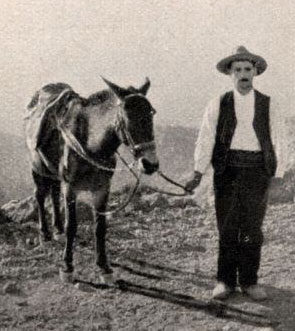Travelling with baggage
We were in a very peculiar position, quite by ourselves (without even a servant), at a wayside house of refuge on a mountain-side, beyond which precincts no vehicle went at this time, and where it was impossible to remain, and without knowing a soul in the island. Luckily Richard spoke the language well. Still, we did not exactly know where we were going. We had an indistinct wish to go to Orotava; but where it was, or how distant at that moment, we knew not; nor did we know, when we got there, if we should find any accommodation, and if not, how we should be able to get back, or whether we should have to pass the night out of doors. Yet it was the happiest moment of my life. I had been through two mortally dull years (without travel), in commonplace, matter-of-fact Old England, where one can't get into a difficulty.
 1910
Independently of this, our baggage–some twenty-five packages–was scattered all over the place on mule-back, some coming up from Santa Cruz, some from Laguna, and the smaller ones with us. They would not know what had become of us. And how were we to rid ourselves of-those we had with us? We saw several handsome, proud, lazy-looking fellows, in blankets, sleeping about, outside the cottage, and asked them if, for a couple of dollars, they would carry these, and walk with us to show us the way? Not a bit of it! They did not want to earn two dollars (8s. 4d.) at such a price! They have nothing, and want nothing but sleep and independence. At last a party of muleteers came by. Richard explained our difficulties, and one good-natured old fellow put our small traps on the top of his pack, and we left orders at the house of refuge with the girl that any mules passing by laden with an Englishman's luggage were to come on to Orotava, and then commenced our walk. And an uncommonly pretty, pleasant walk it was. This path was only fit for mules; and the continuation of the good road we could not enter upon, on account of the people at work, and incessant blasting.
1910
Independently of this, our baggage–some twenty-five packages–was scattered all over the place on mule-back, some coming up from Santa Cruz, some from Laguna, and the smaller ones with us. They would not know what had become of us. And how were we to rid ourselves of-those we had with us? We saw several handsome, proud, lazy-looking fellows, in blankets, sleeping about, outside the cottage, and asked them if, for a couple of dollars, they would carry these, and walk with us to show us the way? Not a bit of it! They did not want to earn two dollars (8s. 4d.) at such a price! They have nothing, and want nothing but sleep and independence. At last a party of muleteers came by. Richard explained our difficulties, and one good-natured old fellow put our small traps on the top of his pack, and we left orders at the house of refuge with the girl that any mules passing by laden with an Englishman's luggage were to come on to Orotava, and then commenced our walk. And an uncommonly pretty, pleasant walk it was. This path was only fit for mules; and the continuation of the good road we could not enter upon, on account of the people at work, and incessant blasting.
Elisabeth Burton, Journals (1863)





